Key moments from the GOP-controlled House’s first 100 days

House Republicans entered the majority 100 days ago with a long list of policy priorities and investigative inquiries.
In the past three months, the conference has ticked-off a number of those tasks: lawmakers passed messaging bills to appeal to the base, opened long-promised investigations and even clinched a few bipartisan victories. The GOP majority, however, is facing down a critical stretch as battles over funding the government and lifting the debt ceiling come to a head.
Here’s a timeline of the major moments from the first 100 days of the House GOP majority.
Jan. 7: Lawmakers sworn in after Speaker chaos concludes
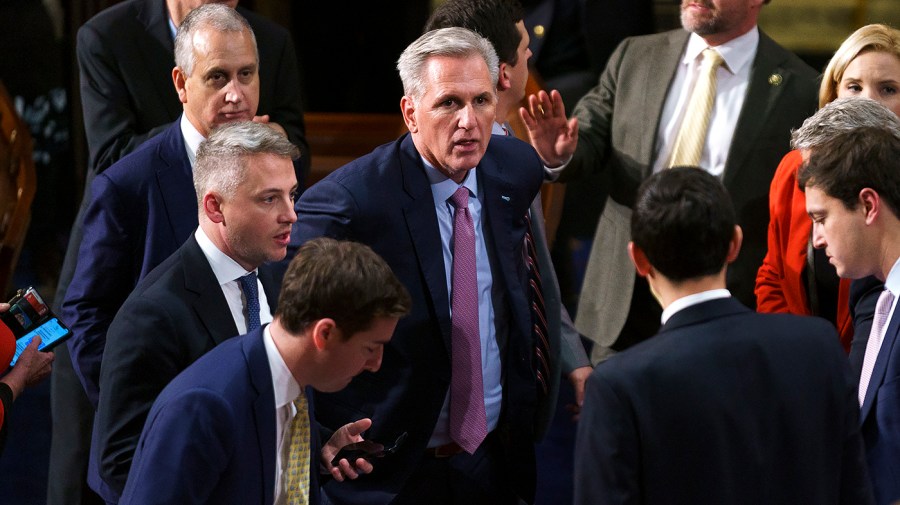
Rep. Kevin McCarthy (R-Calif.) is seen as the House votes to adjourn following the 14th ballot for Speaker on Jan. 6. (Greg Nash)
House lawmakers — new and returning — took their oaths of office in the early morning hours of Jan. 7 after Speaker Kevin McCarthy (R-Calif.) won the gavel on the 15th ballot.
Jan. 9: House GOP passes its first bill in the majority
House Republicans passed a bill rescinding the bulk of an IRS funding boost that Democrats signed into law last year, marking the first piece of legislation approved by the GOP majority. The measure passed in a party-line 221-210 vote.
Jan. 10: House approves resolutions to create panels on China, ‘weaponization’ of government
The House followed through on a GOP campaign promise and clinched a bipartisan victory when it approved a resolution 365-65 to create a select committee on U.S. competition with China.
On the same day, House Republicans approved a resolution to create a subcommittee designed to investigate the “weaponization” of the federal government. The vote was 221-211 along party lines.
Both panels have since held hearings this Congress.
Jan. 11: House passes two abortion measures
Among the House GOP’s earliest priorities was passing the first GOP-led abortion measures since the Supreme Court struck down Roe v. Wade in June.
The Born-Alive Abortion Survivors Protection Act passed in a 220-210-1 vote. One Democrat voted with Republicans in favor of the legislation, and one Democrat voted present. A resolution condemning attacks on anti-abortion facilities and groups passed in a 222-219 vote. Three Democrats joined Republicans in supporting the measure.
Jan. 13: GOP launches probe of Biden’s handling of documents
The House Judiciary Committee launched an investigation into President Biden’s handling of classified documents after news broke that material was found at a private office in Washington, D.C., and his residence in Wilmington, Delaware. The panel asked Attorney General Merrick Garland to provide documents and communications.
Jan. 24: McCarthy blocks Schiff, Swalwell from Intel committee
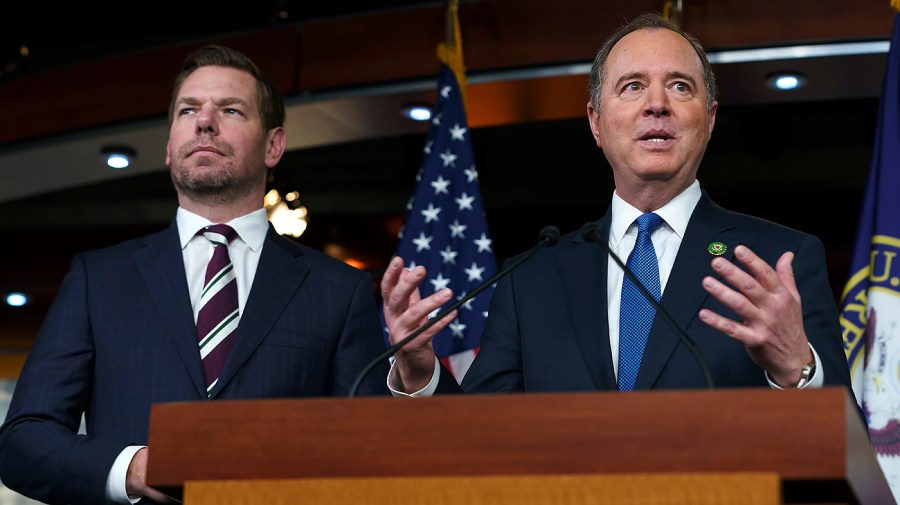
Rep. Adam Schiff (D-Calif.) addresses reporters to discuss Speaker Kevin McCarthy (R-Calif.) rejecting his and Rep. Eric Swalwell’s (D-Calif.) assignments to the House Intelligence Committee. (Greg Nash)
Speaker Kevin McCarthy (R-Calif.) formally blocked Reps. Adam Schiff (D-Calif.) and Eric Swalwell (D-Calif.) from sitting on the House Intelligence Committee, following through on a months-long vow. Members on the panel — formally known as the House Permanent Select Committee on Intelligence — are at the discretion of the Speaker, which is why McCarthy was able to block Schiff and Swalwell despite House Minority Leader Hakeem Jeffries (D-N.Y.) asking that they serve on the committee.
Jan. 27: House passes oil bill after opening amendment process for the first time in seven years
The House opened its amendment process for the first time in seven years this Congress, bringing a bill about the Strategic Petroleum Reserve to the floor under a modified-open rule.
The measure — titled the Strategic Production Response Act — sought to restrict the president’s ability to release oil from the U.S.’s emergency supply. Republicans brought it to the floor after President Biden announced the largest-ever release to help bring down gas prices. It The legislation passed in a 221-205 vote.
Lawmakers submitted more than 140 amendments to the bill, a number of which were debated on the floor. Debate stretched over two days and ran for hours.
Jan. 31-Feb. 1: House passes measures to end COVID-19 emergency
The House cleared two pieces of legislation over two days that sought to end health declarations first enacted by the Trump administration in the early days of the COVID-19 pandemic.
A bill that sought to end the COVID-19 public health emergency passed in a party-line 220-210 vote. It has not moved in the Senate.
A separate resolution aimed at ending the COVID-19 national emergency cleared the House in a bipartisan 229-197 vote, and later passed the Senate 68-23. The Biden administration initially said it was opposed to the legislation, but after the Senate vote, a White House official said the president would sign it into law — which he did in April — notching a victory for GOP lawmakers who have argued that the pandemic is over.
February 1: Biden, McCarthy meet to discuss debt ceiling
Biden and McCarthy met at the White House on Feb. 1 to discuss the debt ceiling, which will have to be raised by this summer to avoid a government default. House Republicans have pushed for cuts to be associated with any debt limit hike while the White House has said it wants a clean increase, putting the two sides on a high-stakes collision course.
The two leaders have not met on the topic since.
Feb. 2: Republicans vote to remove Omar from Foreign Affairs panel

Rep. Ilhan Omar (D-Minn.) addresses reporters to discuss Speaker Kevin McCarthy (R-Calif.) rejecting the assignments of Reps. Adam Schiff (D-Calif.) and Eric Swalwell (D-Calif.) to the House Intelligence Committee. (Greg Nash)
House Republicans voted to remove Rep. Ilhan Omar (D-Minn.) from the House Foreign Affairs Committee, following through on a promise McCarthy made to oust her from the panel as a rebuke for previous comments she made that Republicans labeled antisemitic.
The road to the vote, however, was bumpy — three Republicans initially said they were opposed to the resolution removing Omar, but they ultimately got on board after negotiating with McCarthy behind the scenes.
Feb. 2: Republicans split Democrats on resolution denouncing socialism
House Republicans succeeded in splitting Democrats on a resolution that denounced “the horrors of socialism.” The final tally was 328-86-14, with 109 Democrats voting “yes”, 86 voting “no,” and 14 voting “present.
Republicans were quick to seize on the final vote as a way to paint Democrats as supporters of socialism, and they have returned to the argument several times since.
Feb. 3: Jordan subpoenas administration officials
The House Judiciary Committee — led by Chairman Jim Jordan (R-Ohio) — issued subpoenas to Attorney General Merrick Garland, FBI Director Christopher Wray and Education Secretary Miguel Cardona on Feb. 3 as part of the panel’s investigation into a memo Garland signed in October 2022 pertaining to threats against school board members.
The requests for communications were the first subpoenas sent by the Judiciary Committee in the 118th Congress.
Feb. 7: House Republicans raucous at State of the Union
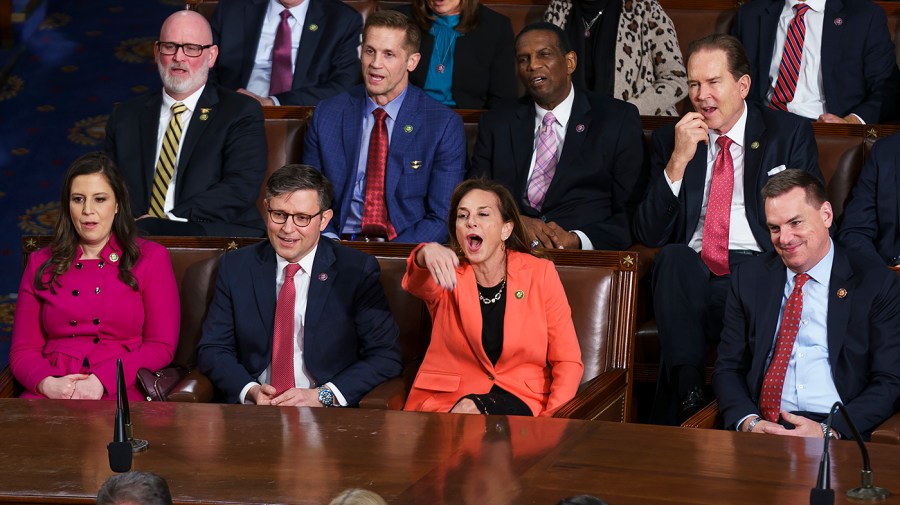
Rep. Lisa McClain (R-Mich.) and other House Republicans talk back to President Biden regarding Medicare and Social Security cuts as he gives his State of the Union address to a joint session of Congress at the U.S. Capitol on Feb. 7. (Greg Nash)
President Biden delivered his second State of the Union address on Feb. 7 to an at times raucous crowd of House Republicans.
Before the speech, McCarthy had said Republicans would not play “childish games.” But about halfway through the speech, some GOP lawmakers started interrupting the president. Rep. Marjorie Taylor Greene (R-Ga.) was heard calling Biden a “liar,” Rep. Andy Ogles (R-Tenn.) yelled “it’s your fault” when Biden spoke about fentanyl and the border, and other lawmakers shouted “secure the border.”
And, in an unusual moment, Biden engaged in a back-and-forth with Republicans on Social Security and Medicare, which appeared to conclude with both sides agreeing that the programs should remain in place.
Feb. 9: House unanimously approves resolution condemning China for spy balloon
The House on Feb. 9 unanimously approved a resolution condemning the Chinese Communist Party’s use of a spy balloon over the continental U.S., a bipartisan rebuke of Beijing’s tactic. The measure called the incident “a brazen violation of United States sovereignty.”
Feb. 9: House passes resolution to block DC crime bill
A vote to block Washington, D.C.’s, revised criminal code again split Democrats, with 173 voting against the measure and 31 voting in favor after the administration said it was opposed to the resolution. The legislation passed 250-173.
But ahead of the vote in the Senate, Biden said he would not veto the measure if it landed on his desk — leading a number of Democrats in the upper chamber to support the legislation and infuriating House Democrats who thought they were voting in line with the White House when they opposed it. Biden signed the measure in March.
March 9: House GOP launches probe into Jan. 6 panel
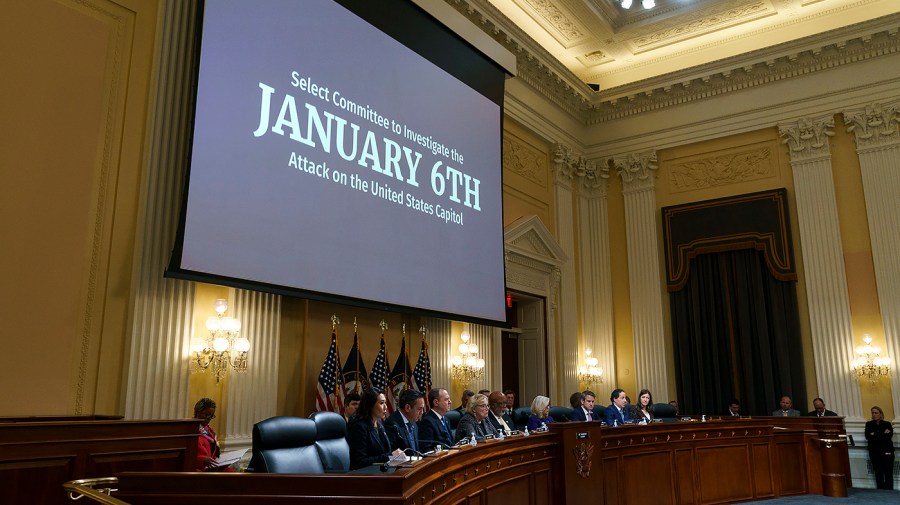
The House Jan. 6 committee holds a business meeting on Dec. 19, 2022, to vote on criminal referrals and give a final presentation prior to releasing their report. (Greg Nash)
Rep. Barry Loudermilk (R-Ga.), the chairman of the House Administration Subcommittee on Oversight, confirmed on March 9 that he had launched an investigation into the Jan. 6 select committee and security failures at the Capitol the day of the riot. Republicans frequently criticized the Jan. 6 panel — which dissolved at the end of the last Congress — for placing such significant focus on Trump’s role in the riot rather than security at the Capitol.
March 10: House unanimously sends COVID-19 origins declassification bill to Biden’s desk
The House unanimously passed a bill on March 10 that would direct the director of national intelligence to declassify information pertaining to the origins of COVID-19, days after the Senate approved the legislation by unanimous consent. President Biden signed the measure into law later that month.
Congress sprung into action on the legislation after The Wall Street Journal reported that the Energy Department determined, with “low confidence,” that COVID-19 most likely came from a laboratory in China.
March 14: GOP gets access to financial activity reports tied to Biden family businesses
The House Oversight Committee, which is conducting an investigation into the Biden family finances, announced on March 14 that the Treasury Department had granted the panel access to financial transaction reports involving companies associated with the Biden family or their associates — marking a victory for the panel, which had been pushing for the information for months.
March 20: Republicans seek testimony from Trump prosecutor
House Republicans launched an investigation into Manhattan District Attorney Alvin Bragg (D) on March 20, days after former President Trump publicly predicted that he would be arrested by Bragg’s office. He was indicted later in the month.
A trio of House GOP chairmen initially requested that Bragg sit for a transcribed interview about his investigation. But Republican lawmakers — namely House Judiciary Chairman Jim Jordan (Ohio) — have since extended the probe, requesting information from current and former prosecutors in the office.
Bragg filed a lawsuit against Jordan in April, calling the congressional probe a “transparent campaign to intimidate and attack” the DA’s work.
March 23: House fails to override Biden’s first veto

President Biden returns to the White House in Washington, D.C., on March 9. Biden held an event in Philadelphia to discuss his newly released fiscal 2024 budget. (Greg Nash)
The House failed to override Biden’s veto of a resolution that sought to repeal a rule from the administration that targets environmental, social and governance (ESG) investing. The GOP-led House approved the resolution in February and the Senate narrowly cleared it one day later, leading Biden to issue his first veto.
Biden issued his second veto on April 6, rejecting a resolution both chambers approved that would undo the Biden administration’s clean water regulations. The House will vote on a veto override next week, a spokesperson for House Majority Leader Steve Scalise (R-La.) confirmed to The Hill, but it will likely fall short of the two-thirds majority needed.
March 23: Lawmakers grill TikTok CEO

TikTok CEO Shou Zi Chew speaks during a House Energy and Commerce Committee hearing entitled “TikTok: How Congress Can Safeguard American Data Privacy and Protect Children from Online Harms” on March 23. (Annabelle Gordon)
The House Energy and Commerce Committee held a blockbuster hearing about TikTok on March 23, where lawmakers from both parties grilled Shou Zi Chew, the CEO of the video sharing app. The event showcased concerns lawmakers have with the platform, and in some cases fueled arguments that it should be banned — a popular stance among GOP members of Congress.
March 24: House Republicans pass Parents Bill of Rights
A high-priority education bill dubbed the Parents Bill of Rights leaned into a hot-button, culture war issue that Republicans are looking to capitalize on heading into the 2024 election cycle after it helped propel Virginia Gov. Glenn Youngkin (R) to the top spot in the Old Dominion in 2021.
Five Republicans voted against the measure, the majority of whom voiced concerns about federalism. The final tally was 213-208.
March 24: Lawmakers visit Jan. 6 defendants in DC jail
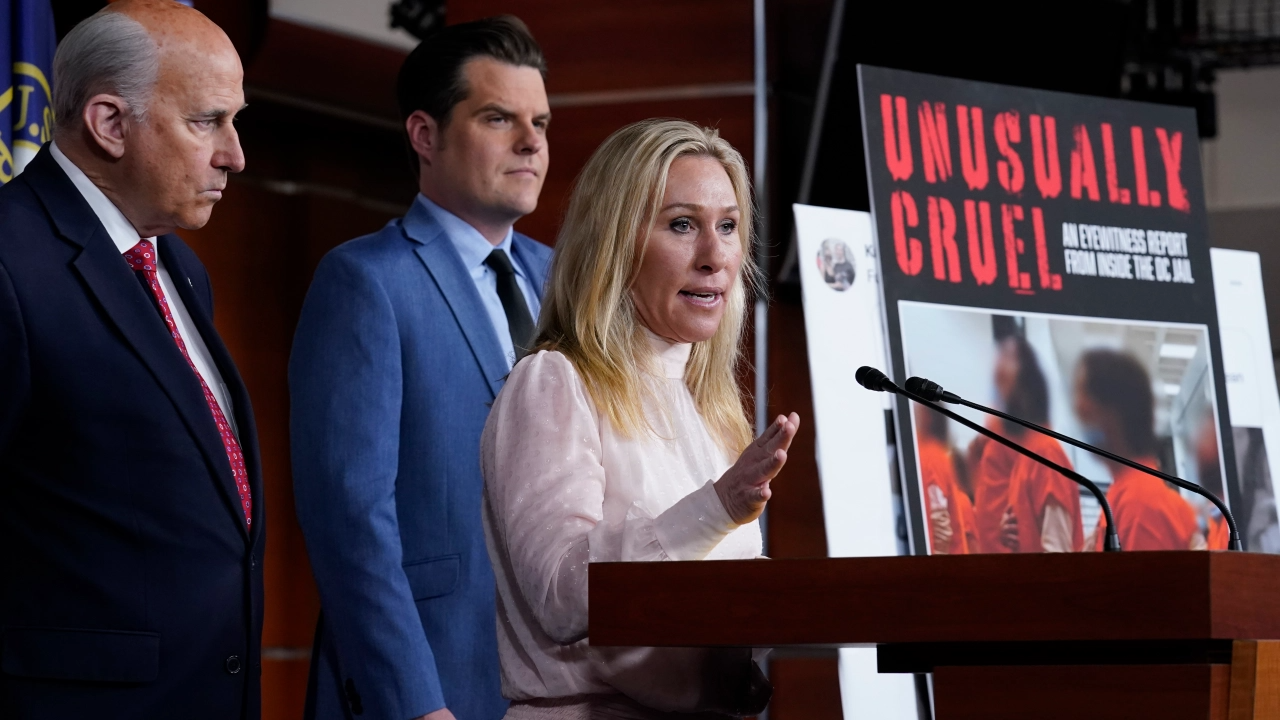
Rep. Marjorie Taylor Greene (R-Ga.) speaks about the treatment of people being held in the District of Columbia jail who are charged with crimes in the Jan. 6 insurrection (AP Photo/J. Scott Applewhite, File).
Members of the House Oversight Committee visited the Washington, D.C., jail on March 24 and met with pre-trial Jan. 6 defendants. Rep. Marjorie Taylor Greene (R-Ga.) led the trip, which she had been working to schedule for months.
After emerging from the facility, however, Greene and Democrats offered different descriptions of the conditions within.
March 28: House GOP subpoenas Biden secretary of State
The House Foreign Affairs Committee issued Secretary of State Antony Blinken a subpoena asking that he provide a July 2021 dissent cable from U.S. officials in Afghanistan that reportedly included warnings about the Afghan government’s collapse.
March 30: House passes H.R. 1 energy package
The House passed an energy package on March 30, which the GOP majority dubbed H.R. 1 — signaling that it was the conference’s top priority. Broadly speaking, the legislation is aimed at bolstering fossil fuel production and exports, domestic mining, and quickening the approval process for energy and other infrastructure products. It also sought to repeal some programs Democrats approved as part of the Inflation Reduction Act last year.
The measure garnered support from four Democrats and opposition from one Republican, making the final tally 225-204.
Copyright 2023 Nexstar Media Inc. All rights reserved. This material may not be published, broadcast, rewritten, or redistributed. Regular the hill posts







